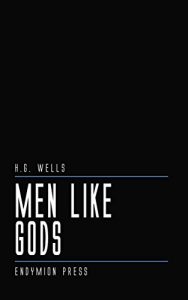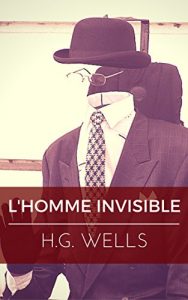Mr. Barnstaple found himself in urgent need of a holiday, and he had no one to go with and nowhere to go. He was overworked. And he was tired of home.
He was a man of strong natural affections; he loved his family extremely so that he knew it by heart, and when he was in these jaded moods it bored him acutely. His three sons, who were all growing up, seemed to get leggier and larger every day; they sat down in the chairs he was just going to sit down in; they played him off his own pianola; they filled the house with hoarse, vast laughter at jokes that one couldn’t demand to be told; they cut in on the elderly harmless flirtations that had hitherto been one of his chief consolations in this vale; they beat him at tennis; they fought playfully on the landings, and fell downstairs by twos and threes with an enormous racket. Their hats were everywhere. They were late for breakfast. They went to bed every night in a storm of uproar: “Haw, Haw, Haw—bump!” and their mother seemed to like it. They all cost money, with a cheerful disregard of the fact that everything had gone up except Mr. Barnstaple’s earning power. And when he said a few plain truths about Mr. Lloyd George at meal-times, or made the slightest attempt to raise the tone of the table-talk above the level of the silliest persiflage, their attention wandered ostentatiously...
At any rate it seemed ostentatiously.
He wanted badly to get away from his family to some place where he could think of its various members with quiet pride and affection, and otherwise not be disturbed by them...
And also he wanted to get away for a time from Mr. Peeve. The very streets were becoming a torment to him, he wanted never to see a newspaper or a newspaper placard again. He was obsessed by apprehensions of some sort of financial and economic smash that would make the Great War seem a mere incidental catastrophe. This was because he was sub-editor and general factotum of the Liberal, that well-known organ of the more depressing aspects of advanced thought, and the unvarying pessimism of Mr. Peeve, his chief, was infecting him more and more. Formerly it had been possible to put up a sort of resistance to Mr. Peeve by joking furtively about his gloom with the other members of the staff, but now there were no other members of the staff: they had all been retrenched by Mr. Peeve in a mood of financial despondency. Practically, now, nobody wrote regularly for the Liberal except Mr. Barnstaple and Mr. Peeve. So Mr. Peeve had it all his own way with Mr. Barnstaple. He would sit hunched up in the editorial chair, with his hands deep in his trouser pockets, taking a gloomy view of everything, sometimes for two hours together. Mr. Barnstaple’s natural tendency was towards a modest hopefulness and a belief in progress, but Mr. Peeve held very strongly that a belief in progress was at least six years out of date, and that the brightest hope that remained to Liberalism was for a good Day of Judgment soon. And having finished the copy of what the staff, when there was a staff, used to call his weekly indigest, Mr. Peeve would depart and leave Mr. Barnstaple to get the rest of the paper together for the next week...
He was a man of strong natural affections; he loved his family extremely so that he knew it by heart, and when he was in these jaded moods it bored him acutely. His three sons, who were all growing up, seemed to get leggier and larger every day; they sat down in the chairs he was just going to sit down in; they played him off his own pianola; they filled the house with hoarse, vast laughter at jokes that one couldn’t demand to be told; they cut in on the elderly harmless flirtations that had hitherto been one of his chief consolations in this vale; they beat him at tennis; they fought playfully on the landings, and fell downstairs by twos and threes with an enormous racket. Their hats were everywhere. They were late for breakfast. They went to bed every night in a storm of uproar: “Haw, Haw, Haw—bump!” and their mother seemed to like it. They all cost money, with a cheerful disregard of the fact that everything had gone up except Mr. Barnstaple’s earning power. And when he said a few plain truths about Mr. Lloyd George at meal-times, or made the slightest attempt to raise the tone of the table-talk above the level of the silliest persiflage, their attention wandered ostentatiously...
At any rate it seemed ostentatiously.
He wanted badly to get away from his family to some place where he could think of its various members with quiet pride and affection, and otherwise not be disturbed by them...
And also he wanted to get away for a time from Mr. Peeve. The very streets were becoming a torment to him, he wanted never to see a newspaper or a newspaper placard again. He was obsessed by apprehensions of some sort of financial and economic smash that would make the Great War seem a mere incidental catastrophe. This was because he was sub-editor and general factotum of the Liberal, that well-known organ of the more depressing aspects of advanced thought, and the unvarying pessimism of Mr. Peeve, his chief, was infecting him more and more. Formerly it had been possible to put up a sort of resistance to Mr. Peeve by joking furtively about his gloom with the other members of the staff, but now there were no other members of the staff: they had all been retrenched by Mr. Peeve in a mood of financial despondency. Practically, now, nobody wrote regularly for the Liberal except Mr. Barnstaple and Mr. Peeve. So Mr. Peeve had it all his own way with Mr. Barnstaple. He would sit hunched up in the editorial chair, with his hands deep in his trouser pockets, taking a gloomy view of everything, sometimes for two hours together. Mr. Barnstaple’s natural tendency was towards a modest hopefulness and a belief in progress, but Mr. Peeve held very strongly that a belief in progress was at least six years out of date, and that the brightest hope that remained to Liberalism was for a good Day of Judgment soon. And having finished the copy of what the staff, when there was a staff, used to call his weekly indigest, Mr. Peeve would depart and leave Mr. Barnstaple to get the rest of the paper together for the next week...













